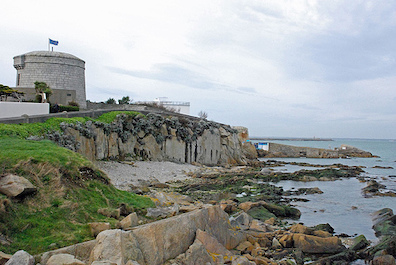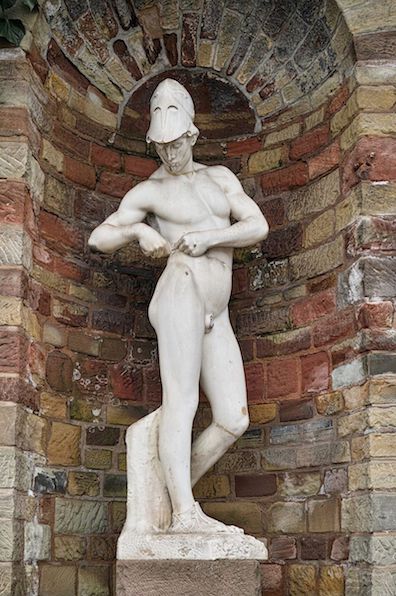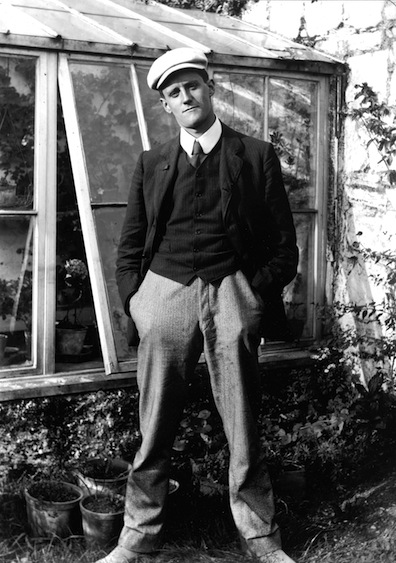Many readers are inclined to dismiss the Homeric
correspondences as overblown distractions, or to limit Joyce's
interest in the Odyssey to his childhood encounter
with Charles Lamb's The Adventures of Ulysses. But
these readers are missing out: Joyce's novel is engaged in a
serious, though hardly straightforward, intertextual dialogue
with Homer's poem. Ulysses evokes the Odyssey
opportunistically, in ways that vary dramatically from chapter
to chapter. The echoes are quirky, unsystematic, imaginative,
and often hilarious,
but they also provoke thought about the commonalities in
ancient and modern human life. Sometimes they are so
exceedingly subtle that a century's worth of readings have
failed to appreciate their extensiveness.
In all print versions of Ulysses, the first three
chapters are preceded by a Roman numeral I, signifying that
they constitute a distinct section. A Roman II introduces
chapters 4-15, while chapters 16-18 constitute section III.
Like the first four books of Homer's poem, often called the
Telemacheia or Telemachiad, the first three chapters of Ulysses
belong to a young man (Telemachus is 20, Stephen 22)
struggling to grow into adult confidence and agency.
Joyce's first novel, A Portrait of the Artist as a Young
Man, was a bildungsroman, and he continued
the story of Stephen Dedalus into Ulysses. But the
mature novel shows Stephen far removed from the hopeful sense
of purpose that he felt at the end of A Portrait,
where he intended to fly by the nets flung at the soul, escape
to Paris, and forge the uncreated conscience of his race. In
this book Stephen is back in Ireland, immersed again in the
misery of his family, living with an Englishman in a tower
built by the British empire, tormented by Catholic guilt,
overshadowed by a superficially more brilliant and successful
companion, hungering for love, drinking too much, and writing
only a few impressionistic and derivative lines of verse.
Homer's poem offered a narrative analogue that could give
structure to the amorphous mass of Stephen's suffering and
striving. Joyce's Telemachiad, however, is anything but a
simple rewriting of Homer's. It is instructive to consider
what he did not include, or included only in glancing and
ironic ways. Homer's Telemachus is holding down the fort for
his father—or wishing that he could. The action is centered on
Ithaca, whose palace has been overrun by insolent young men
seeking to marry Odysseus' widow. Joyce does not really map
this story onto Stephen's, though he echoes it in many ways.
Mulligan's not paying the rent for the tower, and his
determination to drink away the fruits of Stephen's teaching
labors, are almost certainly meant to evoke the suitors'
riotous consumption of the palace's food and drink. Likewise,
Mulligan's contemptuous and contemptible treatment of his aunt's servant
(he steals a mirror from her, and jokes about seducing her)
recalls the suitors' corruption of the palace's female
servants. The old woman who comes to deliver the milk makes
Stephen think that she may be a "messenger" or a goddess in disguise,
recalling Athena's disguised embassy to Telemachus.
Least obviously but most importantly, the chapter is stuffed
with suggestions of violence. Kinch
the knife-blade, Mulligan's razor
and surgical lancet, Haines' revolver, a breakfast knife that hews and
lunges and impales, references to military barracks and expeditions and defenses, emotional "gaping wounds," thoughts
of castration, bodies "cut up
into tripes in the dissecting room," ghouls that chew on corpses: all
these details recreate the atmosphere of the palace in Ithaca,
where 108 young men assault Odysseus' patrimony, threaten the
life of his son, and invite the violent destruction that both
king and prince rain down upon them at the end of the epic.
But Joyce's first chapter contains no patrimonial homestead,
and the allusions suggesting that Stephen might need to
protect his wealth, journey in search of his father, and
violently defend his home from invaders prove to be red
herrings. He may have "paid
the rent" on one occasion, but it is clear that he is
living in Mulligan's home rather than the other way around,
and that Mulligan is supporting
him with clothes and money. Violent antipathy may lurk
just beneath the surface of the two men's relationship, but
Joyce's novel is a deeply pacifist work, and when personal
experience gave him material for Stephen to be threatened with
bodily injury in the tower, he toned it down. The old
milkwoman is no Athena; she does not come to advise Stephen,
and he scorns "to beg her favour." The tower lies close to the
water, but the hydrophobic
Stephen will not be launching a ship; it is Mulligan who
plunges into the sea at the chapter's end.
What does survive Joyce's transformations intact is Homer's
psychological portrait of a young hero in the making.
Mulligan presents himself as Stephen's friend, benefactor, and
mentor, but Stephen sees him as a disrespectful, malicious "Usurper" who would, as he says
much later in Circe, "Break my spirit." Symbolically,
this identifies Mulligan with the chief suitor, Antinous,
whose name means "anti-mind." Telemachus' need to assert adult
male independence of his mother (he, not she, is the
patriarchal heir and presumptive master of the household)
takes the form of Stephen's need to overcome the religious guilt associated
with his mother's dying. Telemachus' physical search for the
father who can help him slaughter his enemies becomes
Stephen's need to realize an idea of spiritual paternity that he
sees as synonymous with authorship. The book will steer
him toward an actual man, Leopold
Bloom, who may somehow give Stephen an image of this
spiritual ideal, but it will not join the two men in any
practical sense comparable to what happens in the Odyssey.
Rather than narrating an existential threat to a kingdom,
Joyce's chapter represents a crisis in the psychological
development of an individual. Stephen has no Ithaca to
restore, but he does need to find a home, both in the literal
sense that when he walks away at the end of the chapter he is
becoming homeless, and in the larger sense that he needs the
familial love and stability that Bloom has found. He needs an
artistic purpose, if he is not to reenact the futility of his
father's life. He needs a personal strength equal to the
forces of British colonial subjection, Catholic puritanical
self-denial, Irish political violence, and Dublin's alcoholic
fatalism. These desperate needs of a spectacularly gifted
young man make Stephen a Telemachus.
Both of Joyce's schemas indicate that Telemachus takes
place between the hours of 8 and 9 AM. The first of these
times is confirmed, near the beginning of the chapter, by the
8:15 departure of the mailboat
from Kingstown harbor, and the second at the chapter's end by
the 8:45 sounding of bells
from some Kingstown tower.



